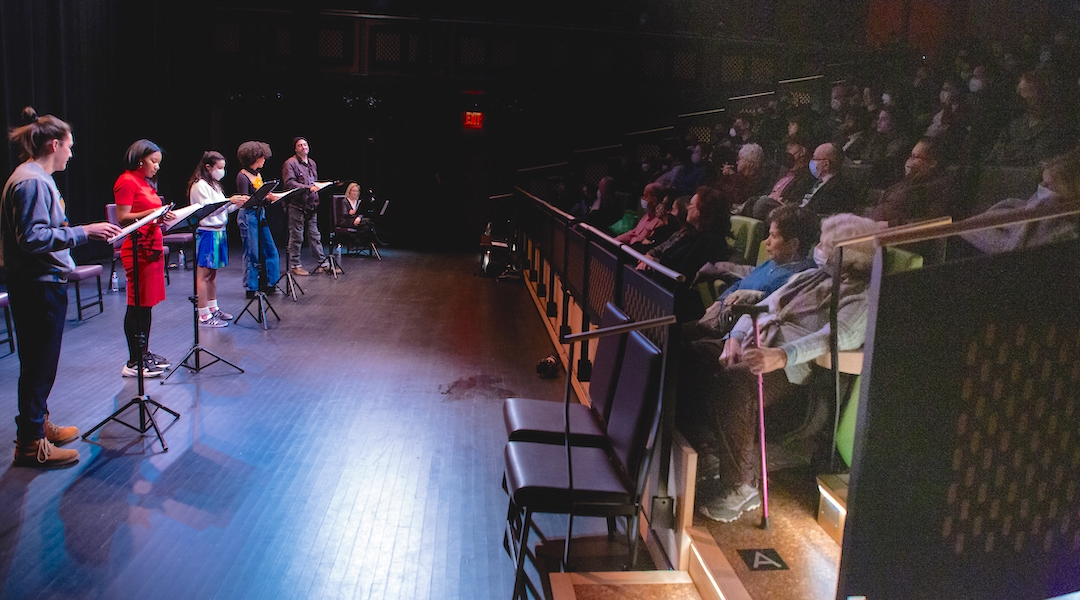(JTA) — Broadway gave out its Tony Awards last month, and as I kept whispering to my wife, it was “a big night for the Jews.”
“Leopoldstadt,” Tom Stoppard’s Holocaust drama, won best play. “Parade,” about the lynching of a Jewish man in the American South, won best musical revival. Miriam Silverman (“The Sign in Sydney Brustein’s Window”) and Brandon Uranowitz (“Leopoldstadt”) won for signature Jewish roles, and Alfred Uhry, who wrote the book for “Parade,” spoke while wearing a two-inch diamond Magen David lapel pin.
It was, in fact, a very prominent season for Jews on Broadway stages and beyond. “The Sign in Sydney Brustein’s Window,” Lorraine Hansberry’s second play — with a white, Jewish protagonist — arrived in a star-studded Broadway bow. “Prayer for the French Republic” at Manhattan Theatre Club — an examination of antisemitism in France — marked a massive turn in playwright Josh Harmon’s Jewish journey (and will return to Broadway next season).
The Atlantic’s Yair Rosenberg raved over Edward Einhorn’s “Shylock and the Shakespeareans,” a reworking of Shakespeare’s “Merchant of Venice,” and Second Stage presented “Camp Seigfried,” a different angle on German fascism. In California, the La Jolla Playhouse tried out “Lempika,” a musical about the notorious Jewish artist Tamara de Lempicka, who fled Europe for the United States in 1939.
You might see a thesis at work in producing these shows — most of which spotlight Nazis, antisemitism or the Holocaust — right now: They urge audiences to remember and learn from the past in order to prevent future atrocities, at a time when antisemitism is on the rise (or at least outward manifestations of the ancient hatred; one could argue it has been there all along).
There’s lots to recommend this idea. A history forgotten is a history that will repeat. Representation matters. Giving Jews the moral victory (if not the narrative one) strengthens our resolve. Great artistry in the service of big ideas is a win for everyone.
And let’s not leave out the performances themselves. Uranowitz in particular was brilliant and gave a moving Tony speech honoring his ancestors who were murdered by the Nazis in Poland.
However, I can’t help but admit to some skepticism. I’m drawn by thinkers like Dara Horn, author of “People Love Dead Jews,” who ask, “By revisiting the history of raging antisemitism, are we just giving violent extremists a to-do list for the future?”

“A Moving Picture” by Jennie Berman Eng, presented at the Marlene Meyerson JCC Manhattan, Dec. 1, 2022. (Basil Rodericks)
And it’s definitely debatable whether reliving trauma is mentally healthy for those affected. (My wife, a daughter of both a Holocaust and Tree of Life shooting survivor, gets significantly triggered by poking at these wounds.)
But more important is that today’s Jewish life — even the parts necessarily focused on antisemitism — is radically different than it was 50 or 75 or 500 years ago. Even with the challenges and outright discrimination, the Jewish community today (here and abroad) is more diverse, more free and more complex than at arguably any time in history.
So I’d like to humbly offer some alternatives for producers and artistic directors who want Jewish representation on their stages. As the artistic director of the Jewish Plays Project, a development house for 21st-century Jewish theater based in New York and working around the country, I have the unique pleasure to be able to point to the plays written in just the last few years that can change the paradigm right now.
I’d like to encourage folks to think about Jewish joy. See Audrey Lang’s amazing character Librarian of the Jewish Soul in her play “Birdie & Cait and the Book of Life” or the Adon Olam sequence at the end of Mark Leiren Young’s “Bar Mitzvah Boy.”
Think about Jewish ethics. Beth Kander’s “Return” puts todays’ scientific breakthroughs and faith right up against each other; Marshall Botvinick’s poetic “To Reach Across a River” gives us an Orthodox woman refusing to leave her faith when she adopts a bi-racial daughter; and Cindy Cooper’s “I Was a Stranger Too” directly advocates for immigrants through a Jewish lens.
Stage Jewish diversity. Ali Viterbi’s “In Every Generation,” Molly Olis-Krost’s “What We Found” and EllaRose Chary’s “The Wrong Question” show us parts of the Jewish world — Jews of Color and queer Jews, among other mixed and modern identities — that haven’t made it to the stage much. (And we’re all waiting with baited breath for the results of Expanding the Canon, Theater J’s significant commissioning program for Jewish artists of Color.)
Talk about Israel/Palestine without blowing the roof of the joint. Seth Rozin’s “Settlements” is nuanced and compelling and real. Alexa Derman’s hilarious and satirical cri-de-coeur “Zionista Rising” — which just won the JPP’s National Playwriting Contest —brings sharp, contemporary humor to a difficult conversation.
And if you feel you have to talk about the Holocaust and Shylock — and sometimes you do — do it with a new and vital eye. Jenny Berman Eng’s “A Moving Picture” features a cast of three Jews of Color, one Black doctoral candidate and a white student working out how to make a 100% true Holocaust film, and Eric Marlin’s “there will come a time for vengeance” mashes up Shakespeare and his contemporary Christopher Marlowe with theatrical flair.
The point is, it’s a big Jewish world out there — exciting and current and diverse. The hundreds of Jewish Plays Project artists and audience members who are part of our ongoing experiment in artistic democracy are hungry to see that life show up at theaters all over the country.
If we can do that, we might see a Tony Awards (and Obies and Jeffs and Barrymores and more) that both celebrates brilliant work and moves the Jewish conversation forward — not by being anti-antisemitism, but by being truly pro-Jewish.
That would really be a big night for the Jews.
JTA has documented Jewish history in real-time for over a century. Keep our journalism strong by joining us in supporting independent, award-winning reporting.







